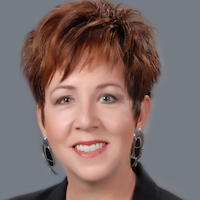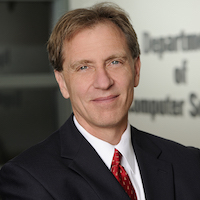CCC at AAAS 2018
The Computing Community Consortium (CCC) has attended and hosted sessions at the American Association for the Advancement of Science (AAAS) Annual Meeting since 2013. Below you can find links to slides and resources from the 2018 sessions and links to related CCC white papers and resources. To learn more about the 2018 AAAS Meeting visit the webpage.
Rethinking Approaches to Disaster Management and Public Safety With Intelligent Infrastructure
Friday, February 16, 8:00 – 9:30 am
Synopsis: Modern societies can be understood as the intersection of four interdependent systems: the natural environment, the built environment, the social environment of humans and their activities, and an information ecosystem overlaying the other three domains. The latter provides the means for understanding, interacting with, and managing the relationships between the natural, built, and human environments. This increased connectedness creates both new challenges and opportunities that demand new approaches to public safety and emergency management. The design and integration of intelligent infrastructure — including embedded sensors, the Internet of Things, advanced wireless information technologies, real-time data capture and analysis, and machine-learning-based decision support — holds the potential to greatly enhance public safety, emergency management, disaster recovery, and overall community resilience, while addressing new and emerging threats to public safety and security.
Speakers:
Michael Dunaway

University of Louisiana, Lafayette
Public Safety Considerations for Smart, Connected Communities
Nalini Venkatasubramanian
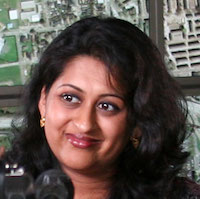
University of California, Irvine
Enabling Resilient Situational Awareness in Disasters: A Cross-Layer Approach
Moderator:
Dan Lopresti
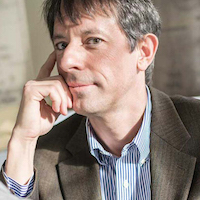
Lehigh University
Related Links:
- Research Agenda in Intelligent Infrastructure to Enhance Disaster Management, Community Resilience and Public Safety white paper
- Intelligent Infrastructure plenary and panel at the 2017 Computing Research Symposium
- Crisis: Critical Real-time Computing and Information Systems report from the 2012 Computing for Disaster Management Workshop
Transforming Cities, Transportation, and Agriculture with Intelligent Infrastructure
Friday, February 16, 10:00 – 11:30 am
Synopsis: Intelligent infrastructure is the deep embedding of sensing, computing, and communications capabilities into traditional physical infrastructure such as roads, buildings, and bridges, in order to increase efficiency, resiliency, and safety. For example, embedding controllers, intersection schedulers, and sensors along roads creates new capabilities for controlling traffic signals and optimizing traffic flow. Across disciplines ranging from engineering to computer science to public policy, intelligent infrastructures are increasingly seen as solutions to the long-standing problems that face local governments. These include strained resources spread across ever-growing urban populations, aging infrastructures and public services systems, competitiveness in the global economy, and acute human and environmental stressors due to rapid growth and change. This session brings together speakers to discuss three critical areas of fundamental scientific research in intelligent infrastructure, and the challenges and barriers to realizing these advances as part of economically sustainable systems.
Speakers:
George Pappas
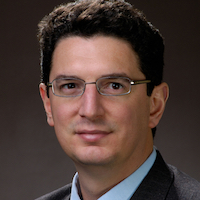
University of Pennsylvania
Future of Mobility Through Innovations in Intelligent Transportation Infrastructure
Shashi Shekhar
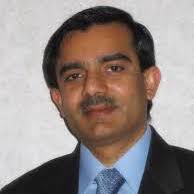
University of Minnesota, Minneapolis
Moderator:
Elizabeth Mynatt

Georgia Tech
Related Links:
- MOBILITY21: Strategic Investments for Transportation Infrastructure & Technology white paper
- City-Scale Intelligent Systems and Platforms white paper
- Intelligent Infrastructure for Smart Agriculture: An Integrated Food, Energy and Water System white paper
- Intelligent Infrastructure white paper series
- Agriculture Big Data (AgBD) Challenges and Opportunities From Farm To Table: A Midwest Big Data Hub Community by Shashi Shekhar, Patrick Schnable, David LeBauer, Katherine Baylis and Kim VanderWaal
- Data Science for Food, Energy and Water: A Workshop Report by Naoki Abe, Yiqun Xie, Shashi Shekhar
- NSF Workshop to Identify Interdisciplinary Data Science Approaches and Challenges to Enhance Understanding of Interactions of Food Systems with Energy and Water Systems blog post
- Capitol Hill Presentation on Deconstructing Precision Agriculture blog post
- Array of Things: A Scientific Research Instrument in the Public Way by Charlie Catlett, Peter H. Beckman, Rajesh Sankaran, and Kate Kusiak Galvin
Artificial Intelligence: Augmenting Not Replacing People
Saturday, February 17, 8:00 – 9:30 am
Synopsis: Artificial intelligence (AI) technologies are rapidly maturing into tools that are impacting our everyday lives. However, contrary to popular conception, most of these tools will not be autonomous, stand-alone systems, but rather will manifest as human assistants and augmentations. While autonomous driving is featured in the headlines, the short-term impact of advances in this field will be increased safety, comfort, and convenience, with the driver still at the wheel. New technologies in healthcare will not replace doctors, but will leverage their skill and judgement by providing super-human augmentations for eyes, hands, and intellect. As more robots move onto the manufacturing floor, they are most likely to function as ever-smarter programmable tools, and will still require human coworkers to teach them new tasks and to do those elements that are simply too hard to automate. This panel explores these themes, emphasizing in particular the areas where AI and people will work together to do what neither can do alone. Each talk highlights a particular focus or application and illustrates both the opportunity for human augmentation in that area, as well as the human-machine technology frontiers each presents. The panel will close with a discussion of the opportunities and challenges of AI technologies for human augmentation.
Speakers:
Moderator:
Ann Drobnis
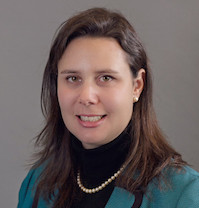
Computing Community Consortium
Related Links:
- Artificial Intelligence for Social Good workshop and report
- AAAI Symposium on AI for Social Good
- Toward a Science of Autonomy for Physical Science: Healthcare by Gregory Hager and Eric Horvitz
- Complementary Computing: Policies for Transferring Callers from Dialog Systems to Human Receptionists by Eric Horvitz and Tim Pack
- Combining Human and Machine Intelligence in Large-scale Crowdsourcing by Ece Kumar, Severin Hacker, and Eric Horvitz
- On Human Intellect and Machine Failures: Troubleshooting Integrative Machine Learning Systems by Besmira Nushi, Ece Kumar, Eric Horvitz, Donald Kossmann
- Reflections on Challenges and Promises of Mixed-Initiative Interaction by Eric Horvitz
- Surgical Data Science for next-generation interventions by Lena Maier-Hein, Swaroop Vedula… and Gregory D. Hager
- Real-time Teaching Cues for Automated Surgical Coaching by Anand Malpani, S. Swaroop Vedula, Henry C. Lin, Gregory D. Hager and Russell H. Taylor
- Recognizing Surgical Activities with Recurrent Neural Networks by Robert DiPietro, Colin Lea, Anand Malpani, Narges Ahmidt, S. Swaroop Vedula, Gyusung I. Lee, Mija R. Lee, and Gregory D. Hager
- Characterizing spatial construction processes: Toward computational tools to understand cognition by Cathryn S. Cortesa, Jonathan D. Jones, Gregory D. Hager, Sanjeev Khudanpur, Amy L. Shelton, and Barbara Landau
- Human-Machine Collaborative Surgery Using Learned Models by Nicolas Padoy and Gregory D. Hager
- Apprenticeship Scheduling: Learning to Schedule from Human Experts by Matthew Gombolay, Reed Jensen, Jessica Stigile, Sung-Hyun Son, and Julie Shah
- Robotic Assistance in Coordination of Patient Care by Matthew Gombolay, Xi Jessie Yang…and Julie Shah

